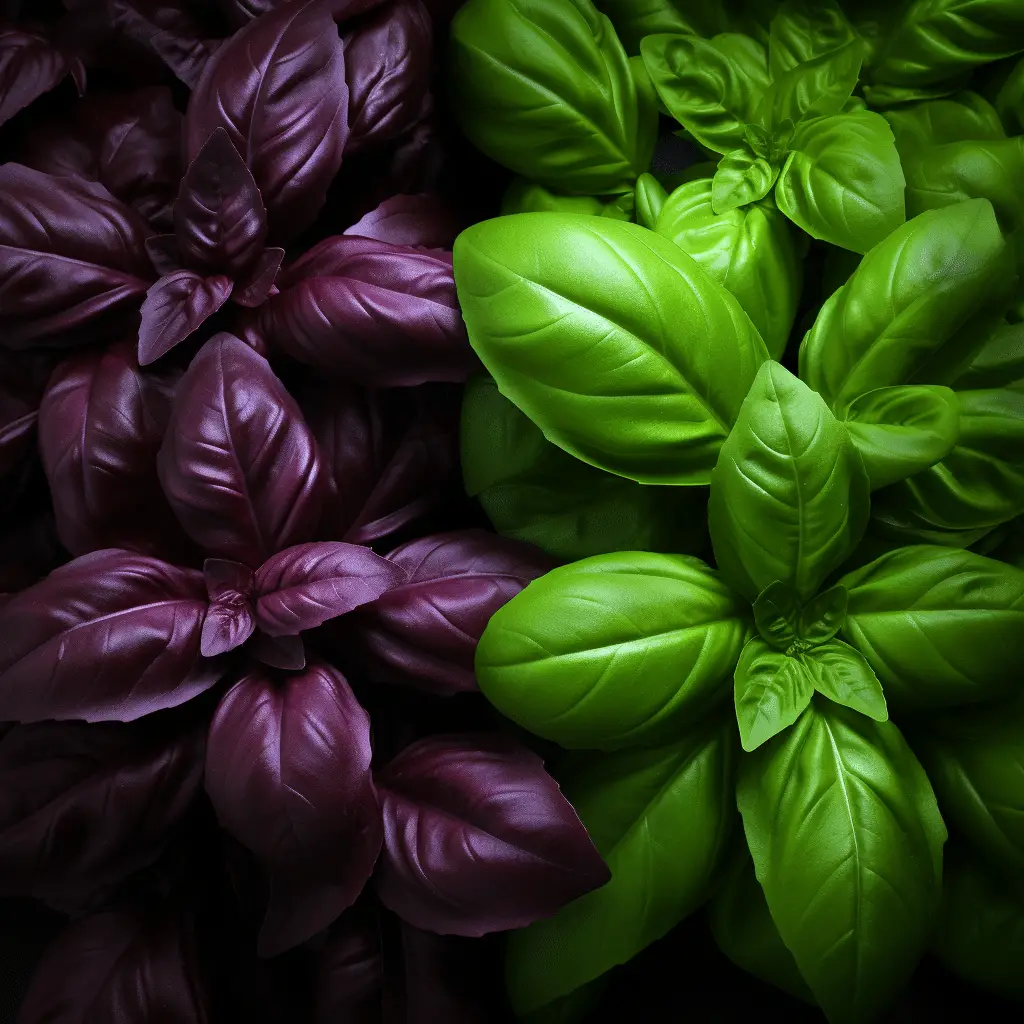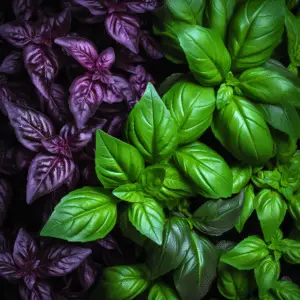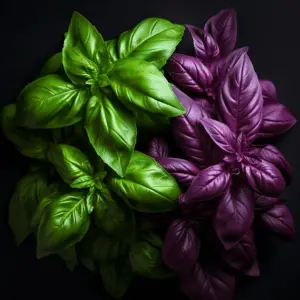
Purple vs Green Basil: Uses, Nutrition and Benefits
Purple vs Green Basil: Basil is a culinary herb of the mint family. It is a tender herb native to tropical regions. There are several varieties of basil; sweet basil, Thai basil, and hybrids such as lemon and African blue basil. Most basil varieties are sweet with green leaves and a few with purple leaves.
The main difference between purple and green basil is the amount of anthocyanin in the leaves. Anthocyanin is the pigment that makes plants have red, blue, and purple colors. Purple basil has a higher concentration of anthocyanin than green basil.
Green basil has a milder taste and flavor than purple basil. In this article, we look at the different uses, nutrition facts, side effects, and contraindications of purple and green basil.

Nutrition facts
Basil contains several nutrients. One serving of 2 teaspoons (5 grams) of basil contains; calories- 1gm, proteins-0.2 gms, carbohydrates- 0.1 gms, fiber-0.1gms, with no sugar and fats. It also contains calcium, Vitamin A, Vitamin k, magnesium, manganese, iron, zinc, and potassium.
It also contains essential oils and antioxidants. Such as beta carotene, beta-cryptoxanthin, and lutein. Fresh basils are more nutritious than dried ones since some nutrients get lost during the drying process.
Culinary Uses
Purple Basil
Purple basil has larger leaves than other varieties of basil, with a strong clove aroma. It is a little less sweet than other Purple vs Green Basil varieties of basil and turns black when cooked. It is mainly used for salads, garnish, or in teas.
When cooked, it alters the flavor and color of the meal. Purple basil is used in food factories for red pigments. It can also be planted as an ornamental plant. The purple varieties include; dark opal, Osmin, purple raffles, and camphor basil.
Green Basil
Green basil has a sweet lemony-clove smell, not as strong as the purple basil, and a sweet flavor. There are different varieties of green basil; Genoese, cinnamon, spicy bush, and lemon basil. Just like any other herb, cooking lowers the nutrient level. You can use it fresh or dried and ground it into powder. Green basil is used in salads, pestos, soups, and broths, among other dishes.
Medical Uses
Basil contains essential micronutrients such as Vitamin k, calcium, and antioxidants that are beneficial in fighting diseases and infections in the human body. Basil was used in ancient times to treat colds, inflammation, and snakebites. This herb is still used in the modern world.
Its health benefits are;
- It may treat stomach problems such as bloating, diarrhea, constipation, and intestinal gas.
- Antioxidants found in basil help in fighting free radical cells that stress the body’s immunity, causing diseases and infections. The antioxidants can help fight cancer-causing cells too. The antioxidants include beta carotene and anthocyanin.
- Basil may help in liver health. It fights toxins that cause some liver diseases.
- The nutrients in basil help reduce aging effects such as wrinkles on the skin. The antioxidants help eliminate toxins from the body leading to healthier skin. Body creams and soaps with basil as an ingredient are great for the skin.
- Basil may help lower blood sugars.
- It may help in improving heart health by reducing high blood pressure.
- Basil may improve mental health by preventing age-related memory loss and increasing the ability to reason.
- Basil can also reduce stress, anxiety, and depression. It also reduces sleep-related disorders.
- Basi has antibacterial properties that help in fighting disease and infections.
- Vitamin K found in basil helps in blood clotting.
- It has anti-inflammatory properties that fight conditions such as arthritis and rheumatism.
Contraindications of Basil
You should avoid using basil during pregnancy. It contains estragole that can cause uterine contractions which may lead to miscarriage or premature birth. However, basil is safe for infants above 6 months but should be in moderation.
You should also avoid using basil without prior medical advice if you suffer from a stomach disorder such as ulcers and gastritis. The aromatic components of basil can trigger an outbreak in a person with intestinal problems such as irritable bowel syndrome and Crohn’s disease. If you have skin redness, avoid using creams and soaps with basil as an active ingredient.
Side Effects Basil
- Overconsumption of basil in persons with high blood pressure and high sugar levels can turn counterproductive. A sudden drop in blood sugar and blood pressure can lead to severe damage to internal organs. Consider getting medical advice on the use of basil in hypertensive and diabetic persons.
- Taking basil along with blood thinners might lower the clotting process further.
- Eunogel, a chemical component found in basil, is an allergen according to WHO. Basil might trigger allergic reactions such as swelling of lips and mouth, hives, irritation, itching, skin redness, diarrhea, and vomiting.
- Extended oral use of basil for medicinal purposes could be harmful due to estragole, a component found in basil, and its excessive use is discouraged.

How To Buy And Store Basil
Basil was originally grown in tropical regions. With globalization, its cultivation spread. It is found in most parts of the world. Basil is simple to grow and does not take a lot of space. You can grow it in your backyard kitchen, on hanging baskets, containers, and in other creative gardens. Fresh basil can be bought in grocery stores, in the vegetable and herbs section, and the dried ones in the dried herbs and spices section.
When buying fresh basil, go for the vibrant and fresh-looking leaves. Check out the expiry date while buying the dried basil. After purchasing or harvesting basil, clean well with running water and pat dry with a paper towel. Wrap it with a slightly wet towel, and store it in the refrigerator in an airtight container.
Purple vs Green Basil there are various varieties of green and purple basils. If used appropriately, basil has a load of benefits for the human body. Excessive consumption of basil might be harmful to your health.